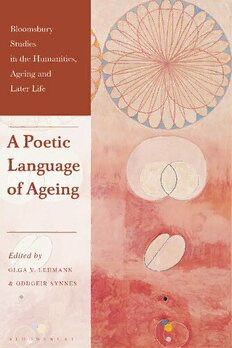
A Poetic Language of Ageing PDF
233 Pages·2023·8.553 MB·
Most books are stored in the elastic cloud where traffic is expensive. For this reason, we have a limit on daily download.
Preview A Poetic Language of Ageing
Description:
Exploring the potential of poetry and poetic language as a means of conveying perspectives on ageing and later life, this book examines questions such as ‘how can we understand ageing and later life?’ and ‘how can we capture the ambiguities and complexities that the experiences of growing old in time and place entail?’ As poetic language illuminates, transfigures and enchants our being in the world, it also offers insights into the existential questions that are amplified as we age, including the vulnerabilities and losses that humble us and connect us.Literary gerontology and narrative gerontology have highlighted the importance of linguistic representations of ageing. While the former has been concerned primarily with the analysis of published literary works, the latter has foregrounded the individual and collective meaning making through narrative resources in old age. There has, however, been less interest in how poetic language, both as a genre and as a practice, can illuminate ageing. This volume suggests a path towards the poetics of ageing by means of presenting analyses of published poetry on ageing written by poets from William Shakespeare to Wallace Stevens; the use of reading and writing poetry among ordinary people in old age; and the poetic nuances that emerge from other literary practices and contexts in relation to ageing – including personal poetic reflections from many of the contributing authors.The volume brings together international scholars from disciplinary backgrounds as diverse as cultural psychology, literary studies, theology, sociology, narrative medicine, cultural gerontology and narrative gerontology, and will deploy a variety of empirical and critical methodologies to explore how poetry and poetic language may challenge dominant discourses and illuminate alternative understandings of ageing.
See more
The list of books you might like
Most books are stored in the elastic cloud where traffic is expensive. For this reason, we have a limit on daily download.
